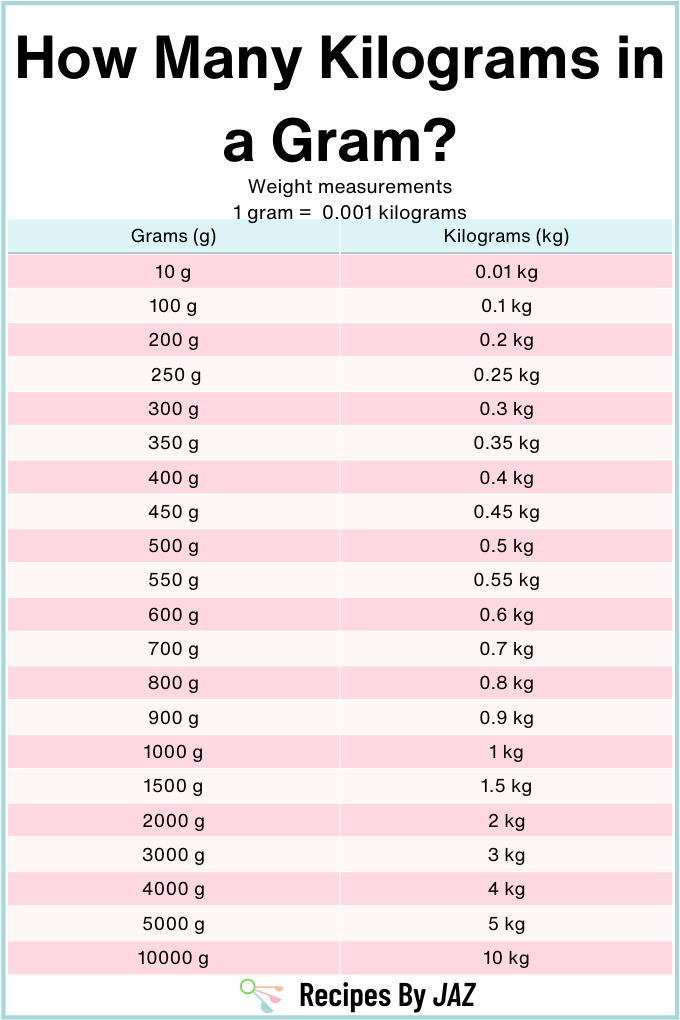There are 0.001 kilograms (kg) in a gram (g). Both grams and kilograms are units of mass measurement in the metric system. This guide includes information on how to convert grams to kilograms, a conversion chart, and more.

What is a gram?
A gram is equal to 0.001 kilograms (kg), 0.00220462 pounds (lbs), or 0.035274 ounces (oz). A gram is a unit of weight measurement in the metric system and is defined as the weight of one cubic centimeter of water.
What is a kilogram?
A kilogram is equal to 1000 grams (g), 2.20462 pounds (lbs), or 35.274 ounces (oz). The kilogram is also a unit to measure weight in the metric system and was first defined in 1795 during the French Revolution as equal to the weight of one liter of water.
Today’s definition of a kilogram is almost identical to this original one, with only a very small difference of 30 parts in a million.
How many kilograms are in a gram?
There are 0.001 kilograms in one gram. On the other hand, there are 1000 grams in one kilogram.
Other useful relationships of weight measures in the metric system and imperial system.
- 1000 grams = 1 kilogram
- 100,000 centigrams = 1 kilogram
- 1,000,000 milligrams = 1 kilogram
- 35.274 ounces = 1 kilogram
- 2.20462 pounds = 1 kilogram
How to convert grams to kilograms?
Grams are the smaller of the two units. One kilogram is equal to 1000 grams. To convert grams to kilograms, you can divide the value in grams by 1000 to get the value in kilograms.
For example, to convert 500 grams to kg, you can divide it by 1000. The answer would be 0.5 kg.
500 g ÷ 1000 = 0.5 kg
How to convert kilograms to grams?
To convert kilograms to grams, you can do the opposite of the above: you can multiply the value in kg by 1000 to get the value in grams.
For example, to convert 0.12 kg to grams, you can multiply 0.12 by 1000, which will give you 120 grams.
0.12 kg × 1000 = 120 grams
Grams to kilograms conversion chart
Below you can find a chart with the conversion of different values of grams to kilograms.

Grams to kilograms conversions:
- 1 gram (g) is equal to 0.001 kilograms (kg)
- 10 grams (g) is equal to 0.01 kilograms (kg)
- 100 grams (g) is equal to 0.1 kilograms (kg)
- 200 grams (g) is equal to 0.2 kilograms (kg)
- 250 grams (g) is equal to 0.25 kilograms (kg)
- 300 grams (g) is equal to 0.3 kilograms (kg)
- 350 grams (g) is equal to 0.35 kilograms (kg)
- 400 grams (g) is equal to 0.4 kilograms (kg)
- 450 grams (g) is equal to 0.45 kilograms (kg)
- 500 grams (g) is equal to 0.5 kilograms (kg)
- 550 grams (g) is equal to 0.55 kilograms (kg)
- 600 grams (g) is equal to 0.6 kilograms (kg)
- 700 grams (g) is equal to 0.7 kilograms (kg)
- 800 grams (g) is equal to 0.8 kilograms (kg)
- 900 grams (g) is equal to 0.9 kilograms (kg)
- 1000 grams (g) is equal to 1 kilogram (kg)
- 1500 grams (g) is equal to 1.5 kilograms (kg)
- 2000 grams (g) is equal to 2 kilograms (kg)
- 3000 grams (g) is equal to 3 kilograms (kg)
- 4000 grams (g) is equal to 4 kilograms (kg)
- 5000 grams (g) is equal to 5 kilograms (kg)
- 10000 grams (g) is equal to 10 kilograms (kg)
Systems of measurement
There are two main systems of measurement: the metric system and the imperial system. The metric system is used in most countries, while the imperial system is predominantly used in a few countries including the United States, Liberia, and Myanmar.
Grams and kilograms are units used to measure mass in the metric system. In contrast, ounces and pounds are used for the same purpose in the imperial system.
The metric system is based on powers of 10, making conversions within the system straightforward. On the other hand, conversions within the imperial system (such as ounces to pounds or pounds to ounces) and between the metric and imperial systems (such as kilograms to pounds or grams to ounces) can be more challenging.
Takeaway
There are 0.001 kilograms (kg) in one gram. To convert grams to kilograms, you can divide the value in grams by 1000 to get the value in kilograms.
